Skip to main content
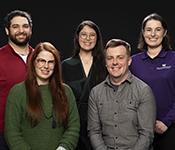 As part of a multiyear initiative, the Allen School reimagined the introduction to programming course series with the goal of better serving the widest range of students across the University of Washington. The UW recognized the team – lecturer Kasey Champion and professors Elba Garza, Miya Natsuhara, Hunter Schafer and Brett Wortzman — behind this transformation with this year’s Distinguished Team Teaching Award in the 2025 Awards of Excellence, one of the University’s highest honors.
Read more →
As part of a multiyear initiative, the Allen School reimagined the introduction to programming course series with the goal of better serving the widest range of students across the University of Washington. The UW recognized the team – lecturer Kasey Champion and professors Elba Garza, Miya Natsuhara, Hunter Schafer and Brett Wortzman — behind this transformation with this year’s Distinguished Team Teaching Award in the 2025 Awards of Excellence, one of the University’s highest honors.
Read more →
June 10, 2025
 Each year, the Association for Computing Machinery recognizes the best Ph.D. dissertations in computer science with its Doctoral Dissertation Award. Ashish Sharma (Ph.D., ‘24), now a senior applied scientist at Microsoft, received the 2024 award for leveraging AI to make high-quality mental health support available to more people. Sewon Min (Ph.D., ‘24), a research scientist at Ai2 and incoming faculty member at the University of California, Berkeley, received an honorable mention for developing a new class of language models that are more efficient and flexible.
Read more →
Each year, the Association for Computing Machinery recognizes the best Ph.D. dissertations in computer science with its Doctoral Dissertation Award. Ashish Sharma (Ph.D., ‘24), now a senior applied scientist at Microsoft, received the 2024 award for leveraging AI to make high-quality mental health support available to more people. Sewon Min (Ph.D., ‘24), a research scientist at Ai2 and incoming faculty member at the University of California, Berkeley, received an honorable mention for developing a new class of language models that are more efficient and flexible.
Read more →
June 4, 2025
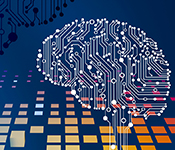 While AI may be decades old, its impact on the way we work, the way we learn and, indeed, the way we live clearly has been accelerating in recent years. What isn’t clear is what comes next; regardless, a growing number of professionals across a range of industries will need the ability to understand, leverage and integrate AI and machine learning as part of their work. Starting this fall, one option for gaining the necessary knowledge and skills will be the Allen School’s stackable Graduate Certificate in Modern AI Methods, a new part-time evening program designed with the needs of working professionals in mind. Read more →
While AI may be decades old, its impact on the way we work, the way we learn and, indeed, the way we live clearly has been accelerating in recent years. What isn’t clear is what comes next; regardless, a growing number of professionals across a range of industries will need the ability to understand, leverage and integrate AI and machine learning as part of their work. Starting this fall, one option for gaining the necessary knowledge and skills will be the Allen School’s stackable Graduate Certificate in Modern AI Methods, a new part-time evening program designed with the needs of working professionals in mind. Read more →
May 28, 2025
 Allen School Ph.D. student Christina Yeung alongside professors Franziska Roesner and Tadayoshi Kohno wanted to understand just how problematic inaccessible ads can be to users who rely on screen readers. By auditing how ads use, or do not use, accessible elements, the researchers found that the overall online ad ecosystem is fairly inaccessible for screen reader users. The researchers received the Best Paper Award at the 2024 ACM Internet Measurement Conference (IMC) last November for their work.
Read more →
Allen School Ph.D. student Christina Yeung alongside professors Franziska Roesner and Tadayoshi Kohno wanted to understand just how problematic inaccessible ads can be to users who rely on screen readers. By auditing how ads use, or do not use, accessible elements, the researchers found that the overall online ad ecosystem is fairly inaccessible for screen reader users. The researchers received the Best Paper Award at the 2024 ACM Internet Measurement Conference (IMC) last November for their work.
Read more →
May 15, 2025
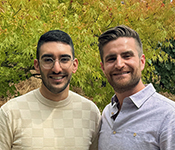 Ever since he was a student, Armon Dadgar (B.S., ‘11) has had his head in the cloud. Inspired by an undergraduate research project, he went on to co-found the high-flying company HashiCorp after graduation. Now, Dadgar and his partner, Joshua Kalla, hope to sow the seeds of the next HashiCorp with a $3 million gift to the Allen School to to support research and student success — and drive the next wave of systems innovation for the artificial intelligence era. Read more →
Ever since he was a student, Armon Dadgar (B.S., ‘11) has had his head in the cloud. Inspired by an undergraduate research project, he went on to co-found the high-flying company HashiCorp after graduation. Now, Dadgar and his partner, Joshua Kalla, hope to sow the seeds of the next HashiCorp with a $3 million gift to the Allen School to to support research and student success — and drive the next wave of systems innovation for the artificial intelligence era. Read more →
May 14, 2025
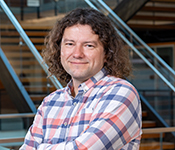 Throughout his career, Allen School professor James Fogarty has advanced human-computer interaction research and played a pivotal role in founding and growing Design, Use, Build (DUB) — UW’s cross-campus HCI alliance. The ACM Special Interest Group on Computer-Human Interaction (SIGCHI) recognized Fogarty’s contributions and inducted him into the SIGCHI Academy Class of 2025 as one of the principal leaders of the field. Read more →
Throughout his career, Allen School professor James Fogarty has advanced human-computer interaction research and played a pivotal role in founding and growing Design, Use, Build (DUB) — UW’s cross-campus HCI alliance. The ACM Special Interest Group on Computer-Human Interaction (SIGCHI) recognized Fogarty’s contributions and inducted him into the SIGCHI Academy Class of 2025 as one of the principal leaders of the field. Read more →
April 23, 2025
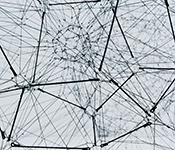 Allen School Ph.D. student Kyle Deeds, who is part of the University of Washington’s Database Group, introduced partition constraints, an innovative approach to making conjunctive query executions in databases more efficient. Deeds and his collaborator presented the research at the 28th International Conference on Database Theory (ICDT) in Barcelona, Spain, where their work received the Best Student Paper and Best Paper Awards. Read more →
Allen School Ph.D. student Kyle Deeds, who is part of the University of Washington’s Database Group, introduced partition constraints, an innovative approach to making conjunctive query executions in databases more efficient. Deeds and his collaborator presented the research at the 28th International Conference on Database Theory (ICDT) in Barcelona, Spain, where their work received the Best Student Paper and Best Paper Awards. Read more →
April 14, 2025
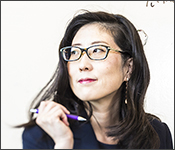 Lee develops explainable AI techniques to gain new insights into complex biological systems and transform medicine. The International Society for Computational Biology recently honored her in its 2025 Class of Fellows for her groundbreaking work that is shaping the future of the field.
Read more →
Lee develops explainable AI techniques to gain new insights into complex biological systems and transform medicine. The International Society for Computational Biology recently honored her in its 2025 Class of Fellows for her groundbreaking work that is shaping the future of the field.
Read more →
April 2, 2025
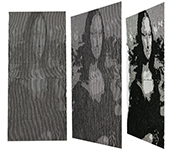 Traditionally, the intricate process of designing illusion knit creations, where stitches of varying heights can produce different images depending on what angle you view the piece, was done by hand. Now, a team of Allen School researchers have introduced computational illusion knitting. The design framework helps automate the process by computationally generating knitting patterns for input designs, making illusion knitting more accessible and allowing for more complex and multi-view patterns that were previously impossible. Read more →
Traditionally, the intricate process of designing illusion knit creations, where stitches of varying heights can produce different images depending on what angle you view the piece, was done by hand. Now, a team of Allen School researchers have introduced computational illusion knitting. The design framework helps automate the process by computationally generating knitting patterns for input designs, making illusion knitting more accessible and allowing for more complex and multi-view patterns that were previously impossible. Read more →
March 5, 2025
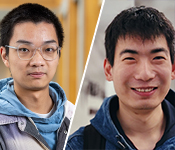 Allen School Ph.D. student Shangbin Feng envisions the work of large language models (LLMs) as a collaborative endeavor, while fellow student Rock Yuren Pang is interested in advancing the conversation around unintended consequences of these and other emerging technologies. Both were recently honored among the 2024 class of IBM Ph.D. Fellows, which recognizes and supports students from around the world who pursue pioneering research in the company’s focus areas. Read more →
Allen School Ph.D. student Shangbin Feng envisions the work of large language models (LLMs) as a collaborative endeavor, while fellow student Rock Yuren Pang is interested in advancing the conversation around unintended consequences of these and other emerging technologies. Both were recently honored among the 2024 class of IBM Ph.D. Fellows, which recognizes and supports students from around the world who pursue pioneering research in the company’s focus areas. Read more →
February 27, 2025
« Newer Posts — Older Posts »
 As part of a multiyear initiative, the Allen School reimagined the introduction to programming course series with the goal of better serving the widest range of students across the University of Washington. The UW recognized the team – lecturer Kasey Champion and professors Elba Garza, Miya Natsuhara, Hunter Schafer and Brett Wortzman — behind this transformation with this year’s Distinguished Team Teaching Award in the 2025 Awards of Excellence, one of the University’s highest honors.
Read more →
As part of a multiyear initiative, the Allen School reimagined the introduction to programming course series with the goal of better serving the widest range of students across the University of Washington. The UW recognized the team – lecturer Kasey Champion and professors Elba Garza, Miya Natsuhara, Hunter Schafer and Brett Wortzman — behind this transformation with this year’s Distinguished Team Teaching Award in the 2025 Awards of Excellence, one of the University’s highest honors.
Read more →

 As part of a multiyear initiative, the Allen School reimagined the introduction to programming course series with the goal of better serving the widest range of students across the University of Washington. The UW recognized the team – lecturer Kasey Champion and professors Elba Garza, Miya Natsuhara, Hunter Schafer and Brett Wortzman — behind this transformation with this year’s Distinguished Team Teaching Award in the 2025 Awards of Excellence, one of the University’s highest honors.
Read more →
As part of a multiyear initiative, the Allen School reimagined the introduction to programming course series with the goal of better serving the widest range of students across the University of Washington. The UW recognized the team – lecturer Kasey Champion and professors Elba Garza, Miya Natsuhara, Hunter Schafer and Brett Wortzman — behind this transformation with this year’s Distinguished Team Teaching Award in the 2025 Awards of Excellence, one of the University’s highest honors.
Read more →
 Each year, the Association for Computing Machinery recognizes the best Ph.D. dissertations in computer science with its Doctoral Dissertation Award. Ashish Sharma (Ph.D., ‘24), now a senior applied scientist at Microsoft, received the 2024 award for leveraging AI to make high-quality mental health support available to more people. Sewon Min (Ph.D., ‘24), a research scientist at Ai2 and incoming faculty member at the University of California, Berkeley, received an honorable mention for developing a new class of language models that are more efficient and flexible.
Read more →
Each year, the Association for Computing Machinery recognizes the best Ph.D. dissertations in computer science with its Doctoral Dissertation Award. Ashish Sharma (Ph.D., ‘24), now a senior applied scientist at Microsoft, received the 2024 award for leveraging AI to make high-quality mental health support available to more people. Sewon Min (Ph.D., ‘24), a research scientist at Ai2 and incoming faculty member at the University of California, Berkeley, received an honorable mention for developing a new class of language models that are more efficient and flexible.
Read more →
 While AI may be decades old, its impact on the way we work, the way we learn and, indeed, the way we live clearly has been accelerating in recent years. What isn’t clear is what comes next; regardless, a growing number of professionals across a range of industries will need the ability to understand, leverage and integrate AI and machine learning as part of their work. Starting this fall, one option for gaining the necessary knowledge and skills will be the Allen School’s stackable Graduate Certificate in Modern AI Methods, a new part-time evening program designed with the needs of working professionals in mind. Read more →
While AI may be decades old, its impact on the way we work, the way we learn and, indeed, the way we live clearly has been accelerating in recent years. What isn’t clear is what comes next; regardless, a growing number of professionals across a range of industries will need the ability to understand, leverage and integrate AI and machine learning as part of their work. Starting this fall, one option for gaining the necessary knowledge and skills will be the Allen School’s stackable Graduate Certificate in Modern AI Methods, a new part-time evening program designed with the needs of working professionals in mind. Read more →
 Allen School Ph.D. student Christina Yeung alongside professors Franziska Roesner and Tadayoshi Kohno wanted to understand just how problematic inaccessible ads can be to users who rely on screen readers. By auditing how ads use, or do not use, accessible elements, the researchers found that the overall online ad ecosystem is fairly inaccessible for screen reader users. The researchers received the Best Paper Award at the 2024 ACM Internet Measurement Conference (IMC) last November for their work.
Read more →
Allen School Ph.D. student Christina Yeung alongside professors Franziska Roesner and Tadayoshi Kohno wanted to understand just how problematic inaccessible ads can be to users who rely on screen readers. By auditing how ads use, or do not use, accessible elements, the researchers found that the overall online ad ecosystem is fairly inaccessible for screen reader users. The researchers received the Best Paper Award at the 2024 ACM Internet Measurement Conference (IMC) last November for their work.
Read more →
 Ever since he was a student, Armon Dadgar (B.S., ‘11) has had his head in the cloud. Inspired by an undergraduate research project, he went on to co-found the high-flying company HashiCorp after graduation. Now, Dadgar and his partner, Joshua Kalla, hope to sow the seeds of the next HashiCorp with a $3 million gift to the Allen School to to support research and student success — and drive the next wave of systems innovation for the artificial intelligence era. Read more →
Ever since he was a student, Armon Dadgar (B.S., ‘11) has had his head in the cloud. Inspired by an undergraduate research project, he went on to co-found the high-flying company HashiCorp after graduation. Now, Dadgar and his partner, Joshua Kalla, hope to sow the seeds of the next HashiCorp with a $3 million gift to the Allen School to to support research and student success — and drive the next wave of systems innovation for the artificial intelligence era. Read more →
 Throughout his career, Allen School professor James Fogarty has advanced human-computer interaction research and played a pivotal role in founding and growing Design, Use, Build (DUB) — UW’s cross-campus HCI alliance. The ACM Special Interest Group on Computer-Human Interaction (SIGCHI) recognized Fogarty’s contributions and inducted him into the SIGCHI Academy Class of 2025 as one of the principal leaders of the field. Read more →
Throughout his career, Allen School professor James Fogarty has advanced human-computer interaction research and played a pivotal role in founding and growing Design, Use, Build (DUB) — UW’s cross-campus HCI alliance. The ACM Special Interest Group on Computer-Human Interaction (SIGCHI) recognized Fogarty’s contributions and inducted him into the SIGCHI Academy Class of 2025 as one of the principal leaders of the field. Read more →
 Allen School Ph.D. student Kyle Deeds, who is part of the University of Washington’s Database Group, introduced partition constraints, an innovative approach to making conjunctive query executions in databases more efficient. Deeds and his collaborator presented the research at the 28th International Conference on Database Theory (ICDT) in Barcelona, Spain, where their work received the Best Student Paper and Best Paper Awards. Read more →
Allen School Ph.D. student Kyle Deeds, who is part of the University of Washington’s Database Group, introduced partition constraints, an innovative approach to making conjunctive query executions in databases more efficient. Deeds and his collaborator presented the research at the 28th International Conference on Database Theory (ICDT) in Barcelona, Spain, where their work received the Best Student Paper and Best Paper Awards. Read more →
 Lee develops explainable AI techniques to gain new insights into complex biological systems and transform medicine. The International Society for Computational Biology recently honored her in its 2025 Class of Fellows for her groundbreaking work that is shaping the future of the field.
Read more →
Lee develops explainable AI techniques to gain new insights into complex biological systems and transform medicine. The International Society for Computational Biology recently honored her in its 2025 Class of Fellows for her groundbreaking work that is shaping the future of the field.
Read more →
 Traditionally, the intricate process of designing illusion knit creations, where stitches of varying heights can produce different images depending on what angle you view the piece, was done by hand. Now, a team of Allen School researchers have introduced computational illusion knitting. The design framework helps automate the process by computationally generating knitting patterns for input designs, making illusion knitting more accessible and allowing for more complex and multi-view patterns that were previously impossible. Read more →
Traditionally, the intricate process of designing illusion knit creations, where stitches of varying heights can produce different images depending on what angle you view the piece, was done by hand. Now, a team of Allen School researchers have introduced computational illusion knitting. The design framework helps automate the process by computationally generating knitting patterns for input designs, making illusion knitting more accessible and allowing for more complex and multi-view patterns that were previously impossible. Read more →
 Allen School Ph.D. student Shangbin Feng envisions the work of large language models (LLMs) as a collaborative endeavor, while fellow student Rock Yuren Pang is interested in advancing the conversation around unintended consequences of these and other emerging technologies. Both were recently honored among the 2024 class of IBM Ph.D. Fellows, which recognizes and supports students from around the world who pursue pioneering research in the company’s focus areas. Read more →
Allen School Ph.D. student Shangbin Feng envisions the work of large language models (LLMs) as a collaborative endeavor, while fellow student Rock Yuren Pang is interested in advancing the conversation around unintended consequences of these and other emerging technologies. Both were recently honored among the 2024 class of IBM Ph.D. Fellows, which recognizes and supports students from around the world who pursue pioneering research in the company’s focus areas. Read more →
